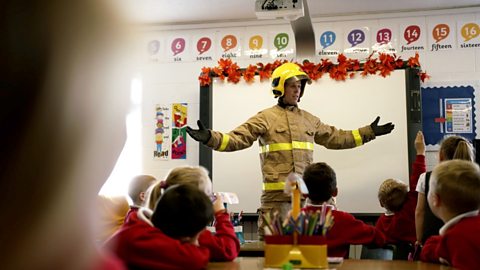Dorrie Mutch: Slated Row is very much about developing our students to become as independent as possible for when they leave Slated Row and go into the world of work or go on to further education, but certainly to follow their dreams, their interests.
So our school is a special needs school for moderate to complex needs. We're an all age school, so we go from the age of four right up to the age of nineteen. Our careers programme is actually part of the timetable now, so all the careers work is linked back to qualifications. So we are using a OCR and the Welsh board to do world of work. With our old school house project, which is a cafe and a B&B that the students run, that is linked to our BTEC qualifications, so we do a BTEC in Hospitality Land Management. And so we also have students that actually go to the cafe, so they can develop their independence skills, their use of money, their communication skills. So our work experience sort of encompasses the whole school really.
We have an enterprise coordinator and an enterprise adviser as well from the careers company that supports us. We have networking events so, for example, we have employers that come into school and it's a bit like a speed dating event. So the students will move around each employer, asking them questions and the employer asking our students questions.
Historically, our work experience was the odd day here and there or blocked week work experience, but we felt that the students weren't really getting much benefit out of that as they needed to embed skills over a longer period of time. And so over the last four or so years, we've developed a link with Bosch Siemens, where our students go down with our job coach and work down at that business in different areas of the business.
So we developed a scheme where in our year 14 we have a bridging year and part of that bridging year is that they have placements down in Bosch, either in the warehouse or with the security team or even the culinary departments centre. What's crucial for it working well is that we have a job coach who learns the roles of the students and what they have to do when they're down at Bosch and so she will learn the tasks, break the tasks down for our students because obviously they learn better in smaller chunks, and she will then step back as their confidence grows and as their skills develop.
So I'm just driving down to Bosch to meet Mel, who's our job coach, and she's working with some of our students today.
Mel Rideway: So my role involves working with a company and accessing work for my students. So I'm liaising with different departments and I'm trying to find work that I know the students will be able to achieve, that they'll benefit from and that we can promote resilience and independence and employability skills. Also the students can be challenged, so that they're actually learning as well and they're well integrated into teams of employees and they feel part of the company.
The students are very anxious to begin with and lacking in confidence. They probably do not want to talk to any of the staff when they first start in the first week but as the weeks progress you can actually see the students begin to acknowledge the staff, begin to have conversations, begin to become integrated into the teams of staff. You can see how able the students are. I feel really, really proud when I see the students after a few weeks, and the ability that they show and you would actually believe that they are a true member of staff.
A number of our students have actually gained employment through the placements. There's one student who worked in a café here at BSH and she's actually gained a placement as a teaching assistant at our school, there's another student who has actually gained employment here at BSH.
Jason: My name is Jason and I work in a warehouse. I do stacking the boxes, cleaning floors and unloading lorries. I got this job through coming to work experience through Slated Row school. My job coach helped me with if I have any problems I can turn to them and if I was still stuck they can come in and actually show me the actual work what I need to do, step by step.
Dorrie Mutch: For our students one of the main noticeable changes was their ability to be more resilient, their confidence, even after a short time in their work placements. It's noted by other members of staff that don't necessarily see them that often how their confidence has grown and their social skills, any social interaction some of our students find really difficult, but from being in their work placements their confidence just goes off the scale really.
My first tip would be to employ a job coach, someone that can liaise between the employer and the school. Second top tip would be to have a enterprise adviser, again they can search out opportunities for you to link with different businesses. My third top tip is you can't do this on your own, so it's about getting your key stage leaders or your curriculum leaders on board, so that they can also plan events each term through every stage of the school so they can have exposure to different employers and activities.
A look at the creative ways a special school for students with moderate to complex needs provides careers guidance.
This is one of five films from a 91Čȱ¬ Teach collection profiling a range of schools and careers practitioners across the UK.

More from this collection:
How do you create a personalised careers journey for every student? video
A look at an all-girls school in London, where the whole leadership team buys into the school's careers vision.

How do you meet the careers needs of a diverse catchment area? video
A look at a secondary school in the South Midlands, where a diverse catchment area means a broad careers programme is needed to meet every student's needs.

Using creative enterprise projects and links with external organisations. video
Visiting a school in Wales that starts its careers programme in year 7 with a one-to-one interview with each child and their parents, where aspirations, targets and any barriers to success are discussed.

How can we encourage children to raise their career aspirations from as early as age 5? video
Profiling a primary school in Northern Ireland to explain how careers can be linked to areas of the curriculum in primary education.

91Čȱ¬ Bitesize Careers. collection
Click here to explore the 91Čȱ¬ Bitesize Careers website. Bitesize Careers is designed for your students and covers the world of work with advice from people who've found the right path for them. The site features over 300 job profile videos, spanning industry sectors, offering case studies and peer-led insights into the world of work.
